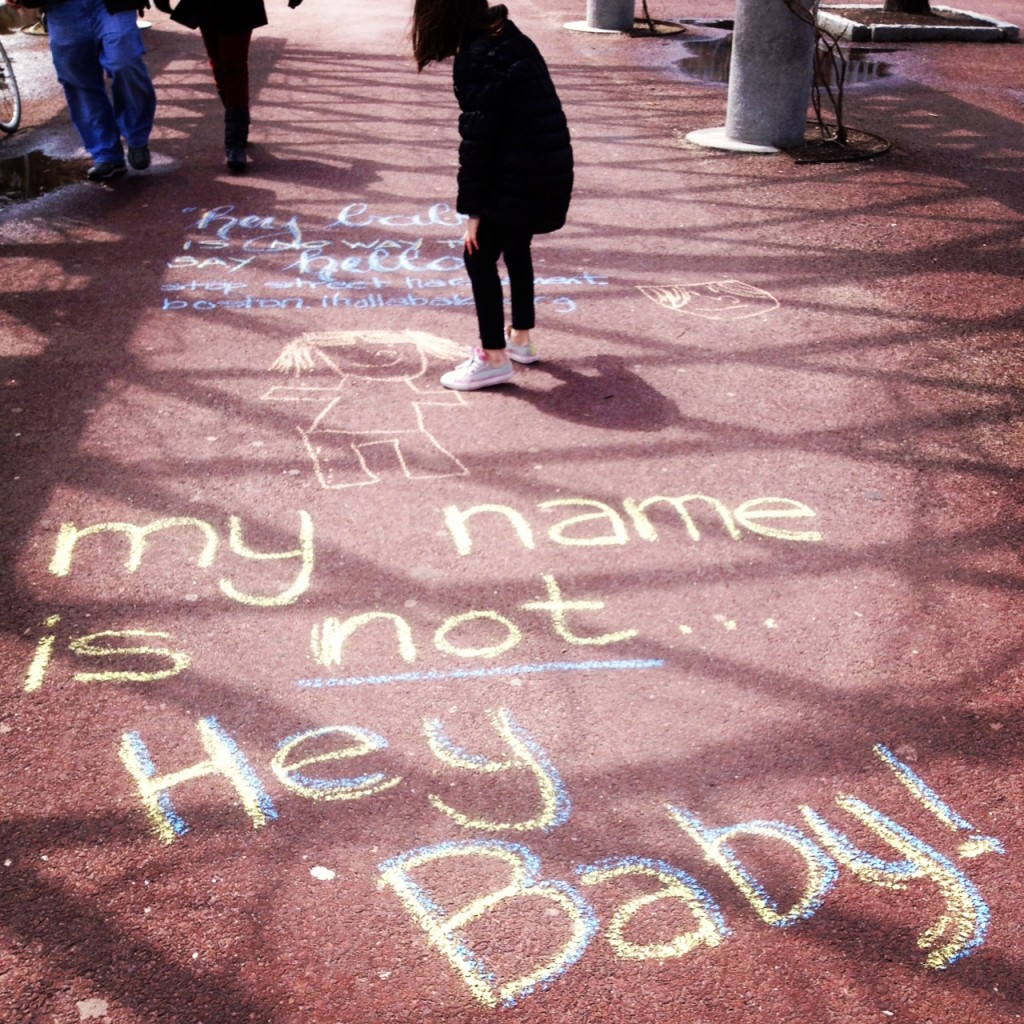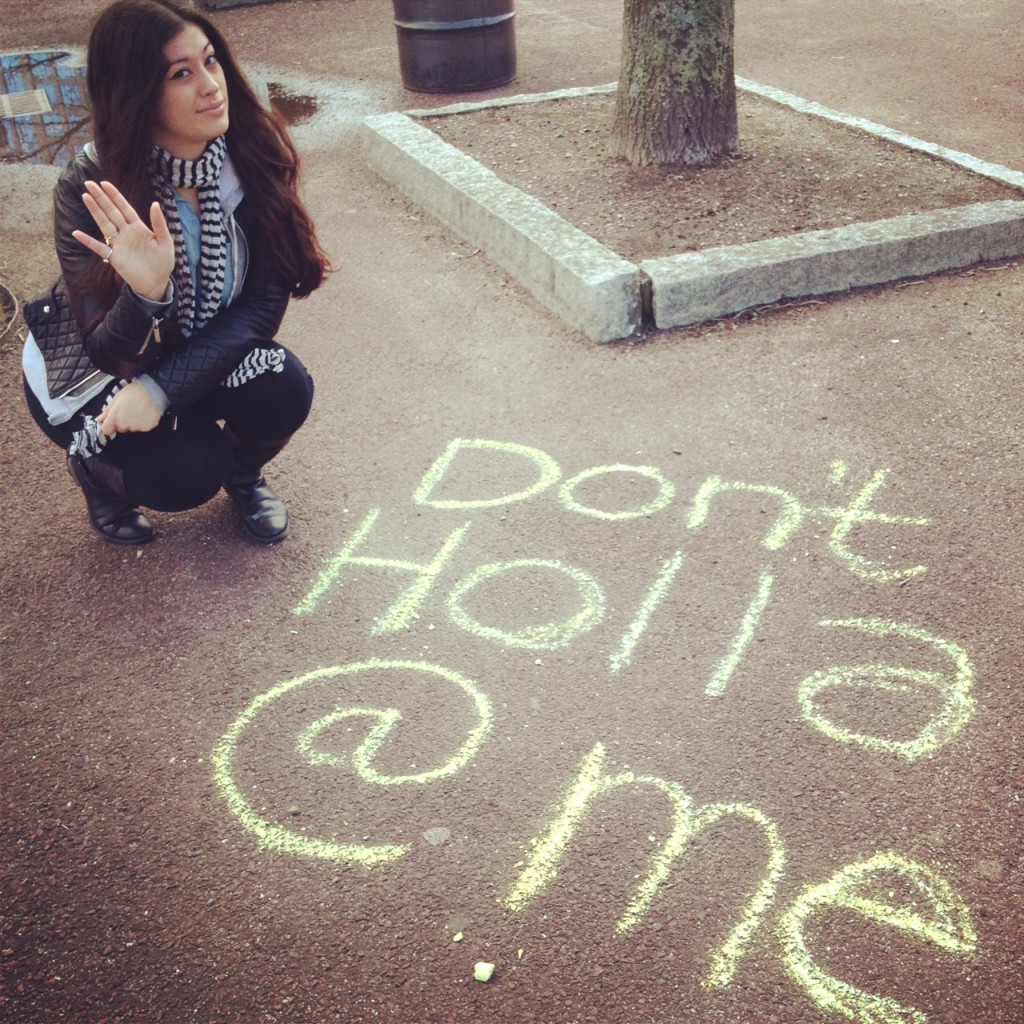This article is by Eve Livingston, a college student in Edinburgh, and is cross-posted with permission from Nanu Edinburgh.
“To understand a man”, said somebody wise once, “you must first walk a mile in his shoes.. It’s a proverb widely reused across popular culture, and often mis-attributed to To Kill A Mockingbird’s resident moral compass Atticus Finch who in actual fact talked of how “You never really understand a person until you consider things from his point of view – until you climb into his skin and walk around in it.” It’s a nice idea, and one that more people should employ in their day-to-day lives – try to see things from other points of view, but acknowledge that nobody can truly understand the problems facing someone but that person him/herself. It is in fact an idea that has much to contribute to feminist discussions of male privilege and intersectionality (the notion that all types of oppression are interconnected and can’t be examined in isolation from each other). Oh Atticus Finch, you feminist icon, you.
It’s no coincidence, though, that these classic lines are gendered in favour of men. Too often the world has worn the shoes of its male inhabitants, with the result that ‘women’s issues’ are frequently dismissed because of their invisibility to those who write the papers and the policy, those who run boardrooms and bars alike. One such issue is that of street harassment, and it’s one that International Anti Street-Harassment Week, which ended yesterday, has attempted to address. When taking street harassment generally to refer to any unwanted verbal or physical attention in a public place, 99% of women over 13 report having experienced it – and yet too often they’re met with disdain as to why they’ve over-reacted to a compliment, or the hilaaaarious joke that us lads would love it if more women pinched us on the bum in nightclubs, ho ho ho.
And maybe you would. Because street harassment is itself symbolic of a wider power relation in which men dominate and control public space. It would be totally out of order (not to mention out of character) for me to smack a man’s bum in the street, but it’s unlikely to evoke the same level of intimidation and panic for him as it does for the 14-year-old girl being followed home from school, or the woman leaving a bar alone with her heart rate raised as she clocks the men standing in a doorway, or the student who’s scared to wait for the bus because of the men in the bus stop making lewd comments. In fact, I’d probably be called a slag or a whore were I to engage in the street harassment behaviour that women experience every day. It is, of course, another signifier that men run the show when it comes to sex. They’re the ones with the desires that just can’t be suppressed and find their outlet in a wolf whistle or a sleazy comment while women find themselves the passive recipients, labelled a slut if they do and a slut if they don’t.
And street harassment doesn’t just refer to these wolfwhistles or sleazy comments. You only need to glance over Everyday Sexism’s #shoutingback hashtag, or the official Anti-Street Harassment Week one #EndSH to see that behaviours we might view as extreme are actually commonplace; women being followed is a common theme, as is the threat of violence. Far too many women report men exposing themselves and often even pleasuring themselves in front of them. Transport is a place full of potential dangers. Going for a jog isn’t safe either. Don’t even mention nightclubs or offices. Young girls aren’t free from harassment, just as harassers start young with women reporting obscene comments from groups of boys as young as 12. It doesn’t matter if they think you’re attractive or not; sometimes you’ll get sexual orders yelled at you, sometimes you’ll be called ‘an ugly dyke’ or laughed at. There is no place in the public sphere safe from harassment, and so street harassment is not a non-issue unless you’re totally fine with women staying indoors all day too afraid to leave. What is there to see outside anyway? Nothing the menfolk can’t deal with.
That men feel entitled to women’s bodies doesn’t bode well in the age of Steubenville and the New Delhi rape. That boys as young as 12 have a sense of male privilege where the sole purpose of women is for their sexual satisfaction doesn’t bode well in a culture where we routinely blame and ostracise women for their rape, while letting perpetrators off on the basis of their victims’ heel height or blood alcohol level. As long as you think that rape and sexual assault are issues, street harassment can’t be invisible. It’s the ugly undercurrent of patriarchy. It is at once a root and a symptom of rape culture.
There’s a misguided idea that it’s difficult for a man to compliment a woman without her getting on her high horse and slapping his hand away, god forbid he should speak to her like that. I’d like to counter that with the somewhat revolutionary suggestion that women, like men, are just human beings. Compliments are good, we like them too. The dictionary definition of ‘compliment’ refers to ‘politeness’. Compliment away! Some of us go out looking for compliments. Some of us go out looking for sex, much like some men do. Feel free to indulge us. The same social cues that apply to men actually apply to us too; if a man isn’t receptive and doesn’t engage with you, you probably leave him alone, right? I hope you’re catching on by now; treat women like human beings with the same respect afforded to anyone else and you’ll be just dandy. If you’re still stuck: when is a compliment not a compliment? When it’s a threat or a statement of intent.
So maybe it’s about time for minimisers of street harassment to walk a mile in a woman’s shoes, or climb into her skin and walk around inside it. See how it feels for every public space to be a potential warzone; for your workplace or place of education to be intimidating, for a night out to turn sour, for your daily run to be punctuated with shouts and whistles. For you to ignore it all only for the perpetrator to turn nasty, and sometimes physically aggressive. For you to be blamed when this is the case, because you were inviting the attention, or giving attitude in the face of a compliment. Walk a mile in a woman’s shoes, or climb into her skin and walk around inside it for you to see that it makes no difference whether the shoes are high or flat, sparkly or plain. That it doesn’t matter if the skin is covered up or on display. Women will continue to receive this unwanted attention no matter what we look like or what we’re wearing, and we’ll continue to be blamed for it. As long as this remains the case, street harassment has to be an issue for everyone. The world has long been overdue a new pair of shoes.




